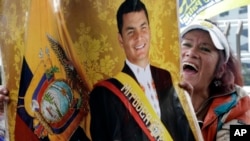Ecuador's ruling Country Alliance party, founded by former president Rafael Correa over a decade ago, has removed President Lenin Moreno as its head, citing "repeated failures" in leadership, as a schism between the former allies deepens.
The Country Alliance party, which has been divided by the two politicians, late on Tuesday announced that Correa ally Ricardo Patino, a former foreign minister, would replace Moreno as party leader.
"The head of the national Country Alliance party has unanimously decided," it said in a statement announcing "the immediate removal of Lenin Moreno as president of the Country Alliance party."
Ecuador's government, however, said it did not recognize the decision and stressed Moreno remained the head of the party.
"Country Alliance is a political party, not an estate ... These actions are wrong and do not reflect the feeling of our political base," acting vice president Alejandra Vicuna told journalists on Tuesday.
Moreno, a Correa protégé who previously served as his vice president, was elected earlier this year to succeed the fiery leftist. At the time, opposition critics warned Moreno would be a puppet of political heavyweight Correa, whom they accused of seeking to stage a presidential comeback in 2021.
But Moreno, a paraplegic former United Nations special envoy on disability, has stunned the Andean country of around 17 million by quickly breaking with Correa, who is now living abroad, in his wife's home country of Belgium.
Moreno, who is seeking presidential term limits via a referendum to revise the constitution, has sidelined another top Correa ally from the vice presidency, and is overseeing a corruption probe that has ensnared former high-level officials.
Vicuna replaced Jorge Glas, who was also Correa's vice president, after Glas came under investigation in a corruption scandal centered on Brazilian construction company Odebrecht. He is currently in jail.
Polls indicate Moreno has widespread popular support in Ecuador. His approval levels have jumped from around 66 percent in May, when he was sworn in, to about 77 percent in September, a recent survey by local pollster Cedatos showed.
Many Ecuadoreans report being satisfied with his attempts to investigate corruption and boost social welfare. His conciliatory temperament is also welcomed by some who were tired of Correa's confrontational style.
Reporting by Alexandra Valencia; Writing by Alexandra Ulmer; Editing by G Crosse





